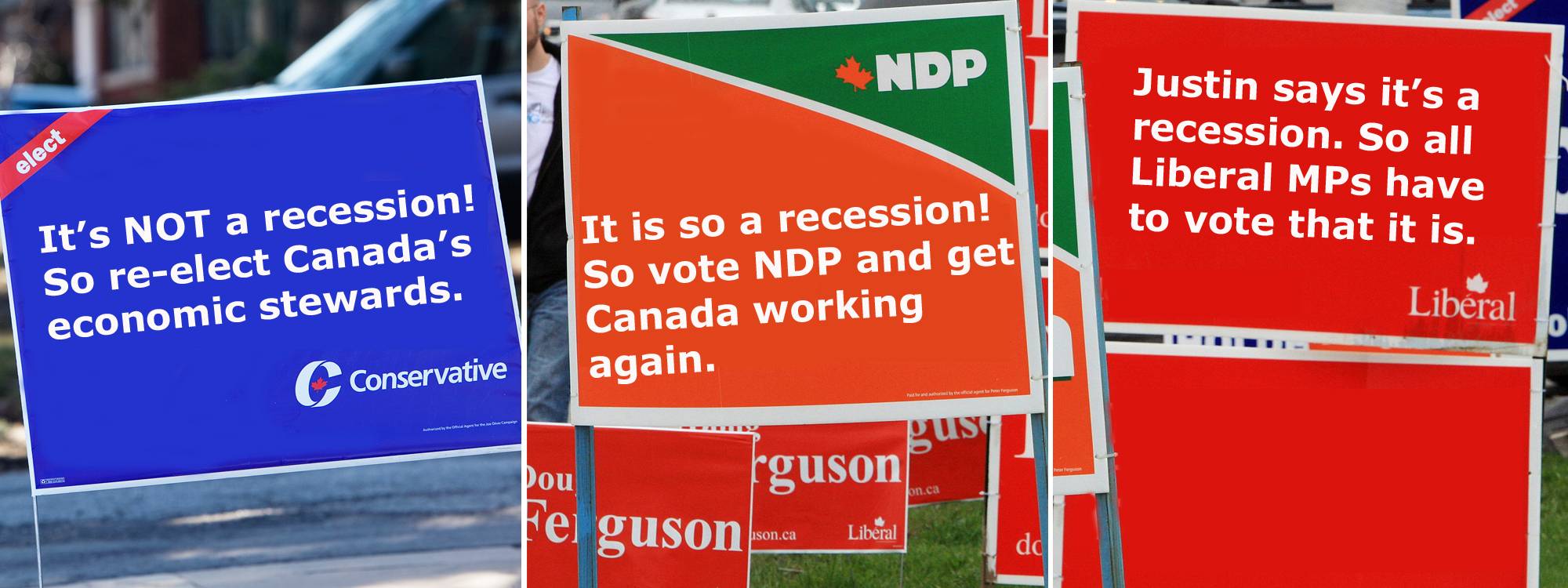Campaign lawn signs I'd love to see

When is a recession a recession?
The Canadian government may be forced by its own words to admit that the country has just come through another recession.
Finance Minister Joe Oliver doesn’t believe that.
Many economists don’t believe it, either.
And as for the Bank of Canada, it believes we’ve just ended two straight quarters of contraction, but won’t call it a recession and doesn’t want to get into a game of semantics.
It’s an issue of debate, particularly after the central bank’s latest forecast, which suggested the economy contracted again in the second quarter, at an annual pace of 0.5 per cent. That would be hot on the heels of a first-quarter annualized contraction of 0.6 per cent, though we’ll have to wait for the final numbers from Statistics Canada.
Those two consecutive quarters would meet the technical definition of a recession, but, as so many economists point out, that doesn’t necessarily hold this time around.
Much of the trouble now is regional and sectoral, driven by the oil shock. And the past six months didn’t look or feel like a recession across the country, with no surge in unemployment, just as an example.
As The Globe and Mail’s Barrie McKenna reports, a C.D. Howe Institute group of economists said this week that the showing so far does not a recession make. It cited the sectoral nature of what has happened, a relatively solid jobs market, and its own definition of a recession: A “pronounced, pervasive and persistent decline in aggregate economic activity.”

But there’s a twist here where Ottawa is concerned.
The recently enacted Federal Balanced Budget Act defines a recession as “a period of at least two consecutive quarters of negative growth,” identical to the technical definition but now enshrined in law.
Mike Moffatt of Western University’s Ivey Business School, who spotted it in the act, believes it’s the only Canadian legislation to actually define a recession.
That doesn’t mean the Ivey assistant professor believes the country just suffered one, by the way. He was just pointing out the definition in the act.
“Over all, yeah, it’s way too early to make a recession call using any definition of the term,” he said, adding that indicators coming in over the next six weeks will be key to the debate.
It’s a fascinating discussion where the act is concerned because the new law demands annual balanced budgets and debt reduction “other than when a recession or extraordinary situation occurs.”
The latter means something that would cost the government more than $3-billion in one fiscal year, caused by a natural disaster or “other unanticipated emergency of national significance,” or “an act of force or violence, war or threat of war, or other armed conflict.”
Recessions and extraordinary situations get really interesting in this case because the government would not be allowed to boost operating budgets to pay for wage increases “if a deficit is projected due to a recession or extraordinary situation that, at the time the budget is tabled, has occurred, is occurring or is forecast.”
Also frozen would be the salaries of the prime minister, ministers, ministers of state and deputy ministers.
It’s not an issue now, the Finance Department points out, because Ottawa has projected a small surplus for the current 2015-2016 fiscal year. Thus there’s no projected deficit to act as a trigger.
Not only that, the act applies only starting with this fiscal year, which began April 1, also the start of the second quarter.
So indeed it’s a case of semantics. But in the run-up to the fall federal election, expect that to be a big deal.
Fed timing unclear
The Federal Reserve is giving no real signal on when interest rates will rise, but some observers still believe the first hike will come in September.
The U.S. central bank said the jobs market is improving, though inflation remains soft, which could stay its hand at its next meeting.
Yet again, the Federal Open Market Committee, the central bank’s policy-setting group, said it will continue to monitor incoming data as it decides whether to hike its benchmark rate from effectively zero.
“The committee anticipates that it will be appropriate to raise the target range for the federal funds rate when it has seen some further improvement in the labour market and is reasonably confident that inflation will move back to its 2-per-cent objective over the medium term,” it said.
“Nobody expected a rate hike today, and nobody should have expected the Fed to pre-commit to anything for September with weeks of data still to get through,” said chief economist Avery Shenfeld of CIBC World Markets.
“As a result, today’s essentially stand-pat statement, with few changes from June, is not particularly revealing, even for those who share our view that a lift-off is coming in September.”
The earnings parade
Several Canadian and global companies are reporting results today, from banks to media concerns.
Facebook Inc. will be in the spotlight after markets close and in the wake of Twitter’s surprise results yesterday.
“Facebook had 1.44 billion active users as of the first quarter of 2015,” said CMC's Mr. Lawler.
“Facebook’s peak user growth is probably behind it but with over a billion users and acquisitions such as WhatsApp and Instagram yet to be monetized, there’s plenty of room for growth,” he added.
“The issue is not Facebook’s growth potential but rather how expensive and how long will it take to get Facebook fully utilizing its user base.”
Chart of the day

Canadians can’t seem to stop borrowing money.
Total household credit is now $1.85-trillion, having climbed in June by $86-billion from a year earlier, Royal Bank of Canada says, citing central bank numbers.